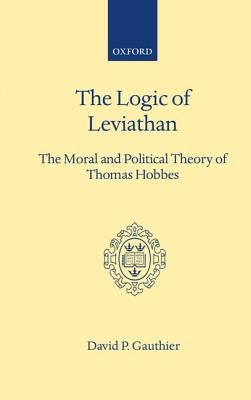
- We will send in 10–14 business days.
- Author: David P Gauthier
- Publisher: OUP Oxford
- ISBN-10: 0198243359
- ISBN-13: 9780198243359
- Format: 14 x 21.6 x 1.8 cm, kieti viršeliai
- Language: English
- SAVE -10% with code: EXTRA
Reviews
Description
This book presents the most plausible reading of Thomas Hobbes's moral and political theory based on his book, Leviathan. Hobbes constructs a political theory that bases unlimited political authority on unlimited individualism. The conclusion requires the premiss; anything less than unlimited individualism would justify only limited political authority. But the premiss is too strong for the conclusions; as this book shows, from unlimited individualism only anarchy follows. The theory is a failure. But it has two outstanding merits. First of all, Hobbes introduces a number of important moral and political concepts that deserve our attention. Obligation is his basic moral concept, while authorisation is his basic political concept. Hobbes relies neither on the goodwill of men - their willingness to consider each other's interests for their own sake, and not as means to self-satisfaction - nor on the efficacy of institutions, as the means of both concentrating and limiting political power. Aside from political and moral theory, the book explores Hobbes's views on the nature of man, sovereignty, and God.
Oxford Scholarly Classics brings together a number of great academic works from the archives of Oxford University Press. Reissued in a uniform series design, they will enable libraries, scholars, and students to gain fresh access to some of the finest scholarship of the last century.
EXTRA 10 % discount with code: EXTRA
The promotion ends in 22d.04:20:35
The discount code is valid when purchasing from 10 €. Discounts do not stack.
- Author: David P Gauthier
- Publisher: OUP Oxford
- ISBN-10: 0198243359
- ISBN-13: 9780198243359
- Format: 14 x 21.6 x 1.8 cm, kieti viršeliai
- Language: English English
This book presents the most plausible reading of Thomas Hobbes's moral and political theory based on his book, Leviathan. Hobbes constructs a political theory that bases unlimited political authority on unlimited individualism. The conclusion requires the premiss; anything less than unlimited individualism would justify only limited political authority. But the premiss is too strong for the conclusions; as this book shows, from unlimited individualism only anarchy follows. The theory is a failure. But it has two outstanding merits. First of all, Hobbes introduces a number of important moral and political concepts that deserve our attention. Obligation is his basic moral concept, while authorisation is his basic political concept. Hobbes relies neither on the goodwill of men - their willingness to consider each other's interests for their own sake, and not as means to self-satisfaction - nor on the efficacy of institutions, as the means of both concentrating and limiting political power. Aside from political and moral theory, the book explores Hobbes's views on the nature of man, sovereignty, and God.
Oxford Scholarly Classics brings together a number of great academic works from the archives of Oxford University Press. Reissued in a uniform series design, they will enable libraries, scholars, and students to gain fresh access to some of the finest scholarship of the last century.


Reviews